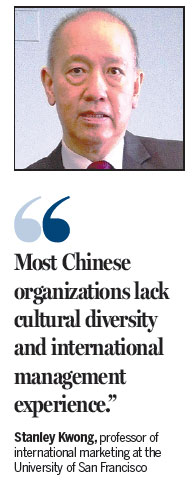Premier's measures favor private businesses to build on existing infrastructure, expert says
China's private companies are set to be the key engine to drive another robust year of merger and acquisition agreements worldwide, a veteran strategic adviser to the San Francisco mayor's office and the San Francisco Bay Area Council has said.
"China's rapidly expanding middle class has been a powerful source of growth and has provided Chinese companies with the large talent pool needed to compete globally," said Stanley Kwong, a professor of international marketing at the University of San Francisco.
Big Chinese companies such as e-commerce giant Alibaba, search engine Baidu, networking and telecommunications equipment and services provider Huawei and commercial property company Wanda have already pioneered this "Go Global" effort.
"Now smaller companies that have deep pockets have started to appear on the world scene and are buying up assets," said Kwong.
He was speaking after the March 5 release of Premier Li Keqiang's Government Work Report, which indicated that the Chinese economy has the resilience and potential to realize growth of 7 percent this year.
In Li's report, the Chinese government vowed to continue its commitment to "further liberalize interest rates" while "allowing the RMB to float more freely".
Kwong said: "These are measures that will ultimately encourage more Chinese enterprises to go global. With the ongoing reform of the Chinese economy, for Chinese companies in many industries, the era of easy, rapid growth is slowing."
"Old competitive advantages of Chinese companies, such as low labor costs, are beginning to erode. Gaining profits is more problematic."
Some Chinese companies, such as computer technology giant Lenovo and consumer electronics and home appliances company Haier, have shown that products bearing "Made in China" labels excel against international competitors.
Chinese investment in the hotel sector worldwide is expected to reach over $5 billion this year, up from $1 billion last year. Chinese corporations have also purchased factories and processing facilities in Detroit and other economically depressed areas of the United States, as well as Smithfield Foods in the US, the world's largest pork producer and processor.
But Kwong had a word of warning. "Chinese companies that wish to go global are hindered because they lack adequate knowledge of consumers in target markets and experience in building leading brands," he said.
"They are still new to international organizational and governance models. Most Chinese organizations lack cultural diversity and international management experience.
"It's one task to run a textile factory or build an electronics factory - you need to raise money, hire engineers, and manage employees. It's extremely difficult to create something as intangible and valuable as a billion-dollar brand that people relate to," said Kwong.
"Many globalization efforts failed because Chinese companies are unable to manage cultural differences, bridge language barriers or understand local markets," he said. "Innovation, marketing acumen, an intimate understanding of global consumers, and an ability to manage global, multicultural talent are becoming critical differentiators of success."
However, China does have a significant competitive edge. "It was and still is the world's factory," Kwong said. "China's sophisticated manufacturing infrastructure is a great foundation for Chinese companies to expand upon.
"Its infrastructure goes beyond the factory," he added. "China has built entire manufacturing and supply chain networks. No emerging market can match China's capability. This infrastructure will allow China to innovate in a way that would be difficult elsewhere."
junechang@chinadailyusa.com

(China Daily 03/14/2015 page6)